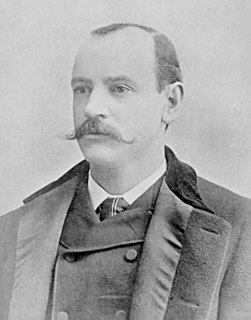
Prescott Sheldon Bush was an American banker and politician.After working as a Wall Street executive investment banker, he represented Connecticut in the United States Senate from 1952 to 1963.A member of the Bush family, he was the father of President George H. W. Bush, who was also the Vice President prior to his presidency, and the paternal grandfather of President George W. Bush and Governor Jeb Bush.

Homer Stille Cummings was a U.S. political figure who was United States Attorney General from 1933 to 1939. He also was elected mayor of Stamford, Connecticut, three times before, founding the legal firm of Cummings & Lockwood in 1909. He later served as chairman of Democratic National Committee between 1919 and 1920.

The United States District Court for the District of Connecticut is the Federal district court whose jurisdiction is the state of Connecticut. The court has offices in Bridgeport, Hartford, and New Haven. Appeals from the court are heard by the United States Court of Appeals for the Second Circuit. It was one of the original 13 courts established by the Judiciary Act of 1789, 1 Stat. 73, on September 24, 1789. The Court initially had a single judge, and remained so composed until March 3, 1927, when a second judge was added by 1927 44 Stat. 1348. Six additional judgeships were created between 1961 and 1990 to bring about the current total of eight judges. Court offices at Hartford and New Haven are located in the Abraham A. Ribicoff Federal Building and the Richard C. Lee United States Courthouse.

Hugh Meade Alcorn Jr. was a U.S. lawyer and political figure. He was a native of Suffield, Connecticut.

The Connecticut House of Representatives is the lower house in the Connecticut General Assembly, the state legislature of the US state of Connecticut. The house is composed of 151 members representing an equal number of districts, with each constituency containing nearly 22,600 residents. Representatives are elected to two-year terms with no term limits. The House convenes within the Connecticut State Capitol in Hartford.

Martha Elizabeth Moxley of Greenwich, Connecticut, was a 15-year-old American high school student who was murdered in 1975. She was last seen alive spending time at the home of the Skakel family, across the street from her home in Belle Haven. Michael Skakel, also 15 at the time, was convicted in 2002 of murdering Moxley and sentenced to 20 years to life. In 2013, he was granted a new trial by a Connecticut judge and released on $1.2 million bail. On December 30, 2016, the Connecticut Supreme Court ruled 4–3 to reinstate Skakel's conviction. The Connecticut Supreme Court vacated the conviction on May 4, 2018 and ordered a new trial.

John Anthony Danaher was a United States Senator from Connecticut and a United States Circuit Judge of the United States Court of Appeals for the District of Columbia Circuit.
Jim or James Mead may refer to:
Albert Elmer Austin was a Republican member of the United States House of Representatives from 1939 to 1941 and member of the Connecticut House of Representatives from 1917 to 1919 and from 1921 to 1923. He was the stepfather of Clare Boothe Luce.

Albert Paul Morano was a U.S. Representative from Connecticut.
William Laurence Tierney was a Democratic member of the United States House of Representatives from Connecticut's 4th congressional district from 1931 to 1933.

William Richard Ratchford was an American politician from Connecticut. He served six terms in the Connecticut House of Representatives, including two as speaker, and three terms in the United States House of Representatives. He was a member of the Democratic Party.
Elizabeth Fones Winthrop Feake Hallett was an early settler in the Massachusetts Bay Colony where her father-in-law John Winthrop served as Governor. Her subsequent behaviour would scandalize the Puritan colony.

Benjamin Tappan was an Ohio judge and Democratic politician who served in the Ohio State Senate and the United States Senate. He was an early settler of the Connecticut Western Reserve in northeastern Ohio and was one of the first settlers in Portage County and the founder of the city of Ravenna, Ohio.
Darius Mead was a member of the Connecticut Senate representing the 12th District from 1844 to 1846.

Robert Jay Walsh was Secretary of the State of Connecticut from 1889 to 1893, and a member of the Connecticut Senate representing the 12th District from 1885 to 1888. He also served as President pro tempore of the Connecticut Senate.
Day Pitney LLP is a U.S. law firm with more than 300 attorneys spread across thirteen offices in five states and the District of Columbia. In 2011, Day Pitney ranked 139th on the National Law Journal's list of the 250 largest American law firms.

The 2018 Connecticut gubernatorial election took place on November 6, 2018, to elect the next governor and lieutenant governor of Connecticut, concurrently with the election of Connecticut's Class I U.S. Senate seat, as well as other elections to the United States Senate in other states and elections to the United States House of Representatives and various state and local elections.














